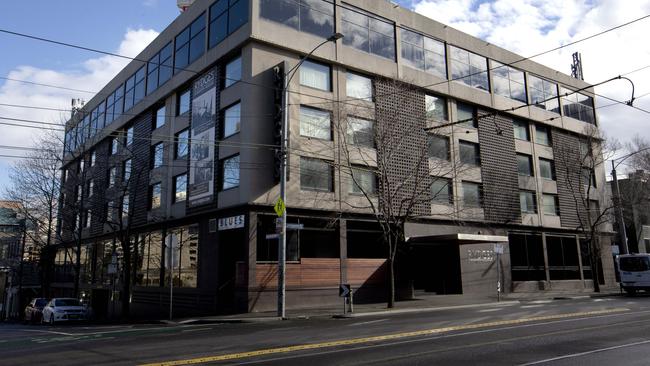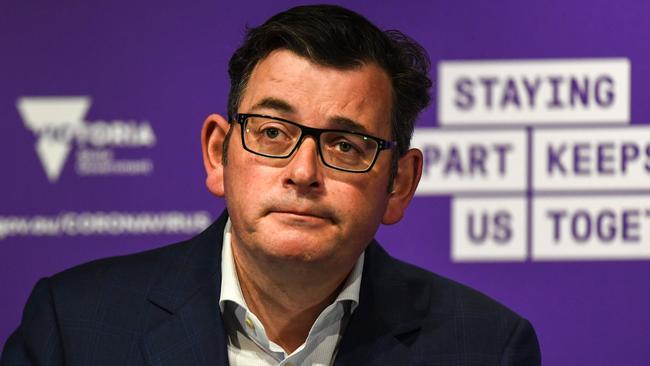Pressure grows to examine phone records to reveal who approved private security to guard hotels instead of police
The failure by anyone in his government to admit to making the decision to use private security in the quarantine hotels is putting pressure on Victorian Premier Daniel Andrews to hand over his phone logs.
News
Don't miss out on the headlines from News. Followed categories will be added to My News.
Premier Daniel Andrews says he would hand over his phone records, and those of his inner circle of staff, if the hotel quarantine inquiry demanded them.
Faced with increasing pressure over the failure by anyone in his government to admit making the decision to use private security in the quarantine hotels, Mr Andrews said he would produce his phone logs — but he had not been asked to do so.
“If they want to make a request of me, then they are free to do so,’’ he said.
“All requests that have been made by the independent board of inquiry have been agreed to.
“If a request were made (to hand over the call logs), then of course. I’ll confirm for you right now, of course we would provide and be co-operative in any way we possibly could.’’
The inquiry wrapped up public hearings two weeks ago but there is increasing pressure for further examination of phone records which could reveal who told former Chief Commissioner of Police Graham Ashton, in a six-minute window on March 27, that private security would be used to guard the hotels instead of police.
The Sunday Herald Sun revealed last week there were legal difficulties obtaining Mr Ashton’s inbound call records under the federal Telecommunications (interceptions and Access) Act 1979.

However, there is nothing stopping Mr Andrews, members of his private office, and senior staff at his Department of Premier and Cabinet, from producing their outbound call records.
A scathing closing submission from Rydges on Swanston, the hotel at the centre of the coronavirus quarantine breaches, called for the records to be produced, saying evidence supported the view that the decision to hire private security had come from within the Department of Premier and Cabinet.
The Rydges lawyers also said the inquiry still had the powers to call for the phone records, even though public hearings had concluded.
Rydges said an assertion by counsel assisting the inquiry that there was no actual decision but rather a “creeping assumption’’ that private security be used was “plainly not supported by evidence”.
The group cited the changing views in text messages sent by Mr Ashton, six minutes after he had texted seeking information from Chris Eccles, Mr Andrews’ right-hand man and the secretary of the Department of Premier and Cabinet.
“Without interrogating the network provider’s records of all incoming and outgoing landline and mobile telephone calls of Mr Ashton, Mr Eccles and those working with them in that short period of time on the afternoon of 27 March 2020, the Chair could not possibly conclude there was simply a ‘creeping assumption’,’’ the submission stated.
“Mr Ashton’s contemporaneous text message, which should be preferred to his lack of recollection in the witness box, indicates that the decision in fact from within DPC.
“A ‘creeping assumption’ takes time to form — it does not form in 6 minutes.
“Further, rather than denying it, Mr Eccles accepted that he may have had someone from DPC call Mr Ashton.’’
The submission states that the relevant phone records did not appear to have been the subject of a Notice to Produce.

“If the incoming and outgoing telephone records are not to be the subject of a Notice to Produce (which the Board can still issue), or have not otherwise been sought or obtained by the Board (which the Board can still request), the only safe finding – which accords with contemporaneous records – is that someone within the DPC decided that private security would be used,’’ the lawyers stated.
“A ‘creeping assumption’ finds no support whatsoever in the evidence. A positive decision from within the Department of Premier and Cabinet is directly supported by the contemporaneous evidence.’’
Victoria Police in its submission notes the difficulties obtaining inbound call records under federal laws.
“Under Part 3-3 of the Telecommunications (Interception and Access) Act 1979 Victoria Police can access telephone records for law enforcement purposes, but in the present context they are in no different position than any other telecommunications customer,’’ it states in a footnote.
The inquiry declined to comment on whether it would seek the records prior to handing down its report on November 6.
MORE NEWS
PRESSURE BUILDS TO HAUL ANDREWS, MIKAKOS BACK TO INQUIRY
POLICE LAY BLAME FOR HOTEL BUNGLE AT ANDREWS DOOR

